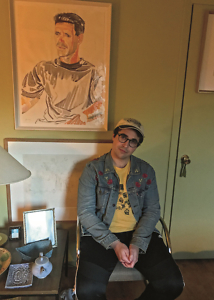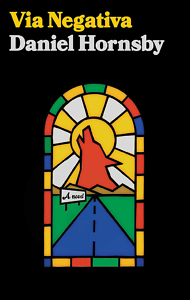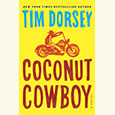Desert Saints
Daniel Hornsby’s novel Via Negativa follows a retired priest’s troubled pilgrimage
The narrator of Via Negativa, the debut novel from Memphis writer Daniel Hornsby, conceals his name for 90 pages, until he visits a roadside attraction in Kansas called “Martin’s Hole to Hell — World-Famous Bottomless Pit.” The pit’s proprietor asks his name, and the narrator, a retired priest on a road trip from Indiana to Seattle, responds, “You can call me Dan.” Or, he implies, you may consider me an anonymous pilgrim, a religious drifter. Like the hero of Dante’s Divine Comedy, Hornsby’s protagonist has lost his way and must undergo an arduous journey to rediscover his true path.

Instead of having Virgil as a traveling companion, this pilgrim drives across the country with a wounded coyote in the back seat of his Camry. He finds the coyote on the side of an Illinois highway, its leg broken. He tries to nurse the animal back to health, drugging it with Niravam to keep it safely groggy until it can be released back into the wild. While this behavior may seem outside the norm for a Catholic priest, it’s in keeping with the lives of the eccentric saints the narrator so admires.
Retired from his parish after four decades of pastoral service, the narrator has been expelled from his diocese for heretical gardening (i.e., creating a zen rock garden). Now he lives out of his car, “a mobile monk’s cell,” on his way to visit his oldest friend, Paul, in Colorado before heading to Montana to settle an old score. He aspires to the model of spiritual quest set by the Desert Fathers as described in Thomas Merton’s The Wisdom of the Desert.
“I really can’t compare myself to those great mothers and fathers of the desert, but I’m trying to see myself as their disciple, a fellow anchorite trying to rely more and more on God in all aspects of my life,” he says. “Or, to put it another way, I’m on my way to some holy place.”
The journey is not without risk. Every time the narrator offers the coyote Spam with a spoon, there’s a chance the animal, whom he calls Bede after the medieval monk, will return to its feral state and literally bite the hand that feeds it. The injured coyote limps around the periphery of the novel, his predatory teeth poised to strike, a proverbial gun ready to go off — until, that is, the narrator acquires an actual gun and the ammunition to use it. Eventually, he reveals his motivation for revenge against an older priest now living in a Catholic nursing home in the Mission Mountains. He must decide between holy vengeance for crimes against defenseless boys and divine forgiveness.
 Hornsby’s novel works as the memoir of a complex man of the cloth and as theological meditation. As young men in “minor seminary,” an Indiana boarding school to prep “oblates” for the priesthood, Paul and the narrator embrace the via negativa, the “negative way.” Don’t try to picture God; rather look for “God in the dark. God in a cloud. God in the corner of your eye.”
Hornsby’s novel works as the memoir of a complex man of the cloth and as theological meditation. As young men in “minor seminary,” an Indiana boarding school to prep “oblates” for the priesthood, Paul and the narrator embrace the via negativa, the “negative way.” Don’t try to picture God; rather look for “God in the dark. God in a cloud. God in the corner of your eye.”
“If anything, all my vision-seeking has only confirmed the paradox of God hiding, perfectly, in plain sight,” the narrator says. “If we want to see God in the world, all we have to do is see the world. If we want to see God in human form, look at people.”
A God who hides, though, is a God whose will be can be difficult to descry, and harder still to act upon. As Hornsby’s pilgrim surveys his life, he sees a landscape dotted with judgment errors and sins of omission, failures of nerve, and cowardly silence. Now in his 60s, he has swung to the other extreme, acting on whims without calculating their costs. That recklessness, coupled with recent losses of friends, creates on ominous mood. We sense that he could lash out in righteous violence or succumb to self-destruction.
Hornsby balances the dark moments with good-spirited comedy. If half of Via Negativa resembles Marilynne Robinson’s Gilead — which features another minister-narrator reviewing a troubled career — the other half feels like Clint Eastwood’s Every Which Way but Loose, with the coyote Bede playing the role of Clyde the orangutan. The narrator encounters a lively parade of American eccentrics, from a teenage pyromaniac to a recovering addict/bar owner who needs to confess distant sins to propitiate the ghost of her parents.
Via Negativa is a remarkable performance in narrative voice, a convincing rendition of late-life wisdom captured in evocative sentences. Hornsby’s pilgrim doesn’t need to find a new home, necessarily, and certainly not a final resting place. Perhaps he simply needs sufficient peace to perceive intimations of a “life beyond the one I had there and then,” fugitive divinity “swirling in corners of my eyes, brushing up against the hairs of my arms.”

Sean Kinch grew up in Austin and attended Stanford. He earned a Ph.D. from the University of Texas and now teaches English at Montgomery Bell Academy in Nashville.


